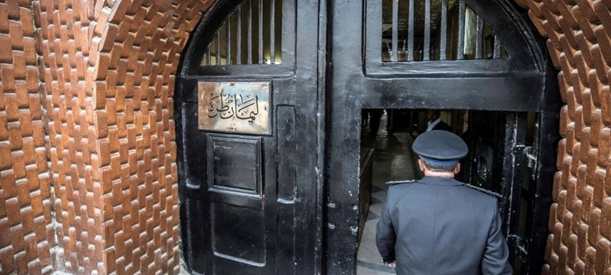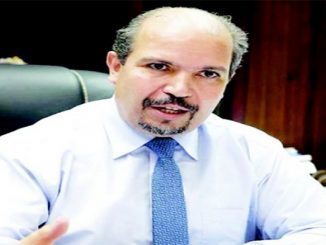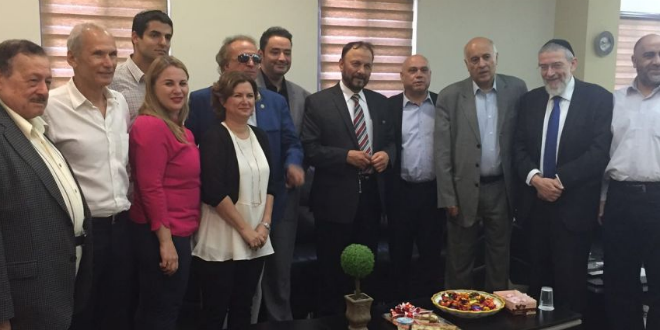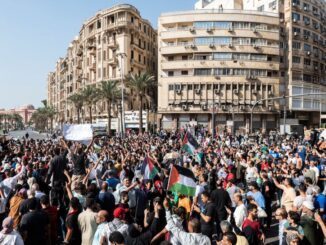
In the wake of the Cop27 summit held in Sharm el-Sheikh, repression in Egypt is back but now at full steam, and the world is no longer watching violations.
During the UN climate conference (COP27), human rights in Egypt were in the spotlight. But dozens of activists are now again given heavy prison sentences without any reaction from world countries, according to a report by Emma van der Zalm on NRC, a Dutch newspaper.
“The ‘pause’ in human rights violations in Egypt is already over,” the Dutch journalist based in Cairo states, continuing:
During the UN climate conference (COP27) in November, all eyes were on the country and dissidents got more air. Meanwhile, there is increasing repression is currently underway.
On March 5, some thirty human rights activists were sentenced to heavy prison terms in a mass trial. Seventeen of them received life sentences.
During the climate conference, there was an active campaign for the release of one of the most famous political prisoners, Alaa Abd El-Fattah. World leaders put pressure on Egypt’s Sisi and all the international attention finally gave other Egyptian activists a platform. But how would the regime react after the departure of the international community? “We were hopeful, but actually knew better,” says human rights defender Sherif Azer of the Egyptian Commission for Rights and Freedoms.
Repression in full swing
Of all convicted activists, a dozen have been in prison since 2018. Among them is Ezzat Ghoneim, executive director of the Egyptian Coordination for Rights and Freedoms (ECRF), a human rights organization that documents enforced disappearances and death sentences and provides legal assistance to victims of human rights violations. That organization has long been a thorn in the side of the Egyptian leaders. Ghoneim was sentenced to fifteen years in prison.
He was arrested on March 1, 2018, was untraceable for three days and then appeared in a video released by the Ministry of the Interior. In it he is accused of terrorism and makes a confession. In the footage, Ghoneim appears stressed and shows visible signs of torture. That same year, three colleagues were also arrested.
The arrests came in a context of unprecedented repression, said Hossam Bahgat, human rights activist and founder of the Egyptian Initiative for Personal Rights.
In early 2018, Sisi ran for a second term. In the run-up to the presidential elections in March that year, Sisi eliminated his political opponents. The pressure was further increased in 2019, when Sisi called a constitutional referendum that extended the presidential term by two years and allowed for a third term. Sisi can therefore remain in power until 2030.
The wave of arrests peaked in the wake of protests against the president in 2019, when more than 4,000 people were arrested.
Six months after his arrest, activist Ghoneim is transferred to a headquarters of the National Security Service and then disappears from the radar again. Only four months later does he show up in court.
After two years in pretrial detention, the legal limit in Egypt, Ghoneim is being ‘rotated’: a well-known practice whereby prisoners are charged in parallel cases, so that after being acquitted in one case they can still be held in detention in another.
Ghoneim will serve three years in pretrial detention when his case comes to court in May 2021. In the case in question, dozens of political prisoners are accused of ties to the Muslim Brotherhood, which is officially regarded as a terrorist organization in Egypt.
Although the state of emergency in Egypt is no longer in effect, the case is still being heard in an emergency court, arguing that the state of emergency was functioning at the time of the arrests. A trial under the emergency rules means, first of all, that it will be held behind closed doors, but also that the sentences handed out at the beginning of this month will be ratified by the president – a violation of the separation of powers – and that the convicted will also not be able to appeal.
“What we feared is now happening,” says activist Bahgat. The number of new political prisoners is three times higher than the number released by order of the amnesty commission. New websites are blocked. And four journalists from Mada Masr, one of the few independent news media, face a prison sentence of six to 24 months for an article about corruption within a loyalist political party. “But the world is looking the other way,” says Bahgat.
“All we hear is silence. The leaders came, went home and forgot their promises,” writes the sister of political prisoner Alaa Abd El-Fattah in a press release about the United Nations’ lack of action on human rights abuses in Egypt.
That is worrying, argues Bahgat. “The situation is getting more and more serious. This is the last year of the president’s second term and we expect elections soon. At the moment the atmosphere is so tense and the space for civil society so small that not one person has yet announced that they will run against the president. And with the bad economic situation, we have all the ingredients for even more repression.”



